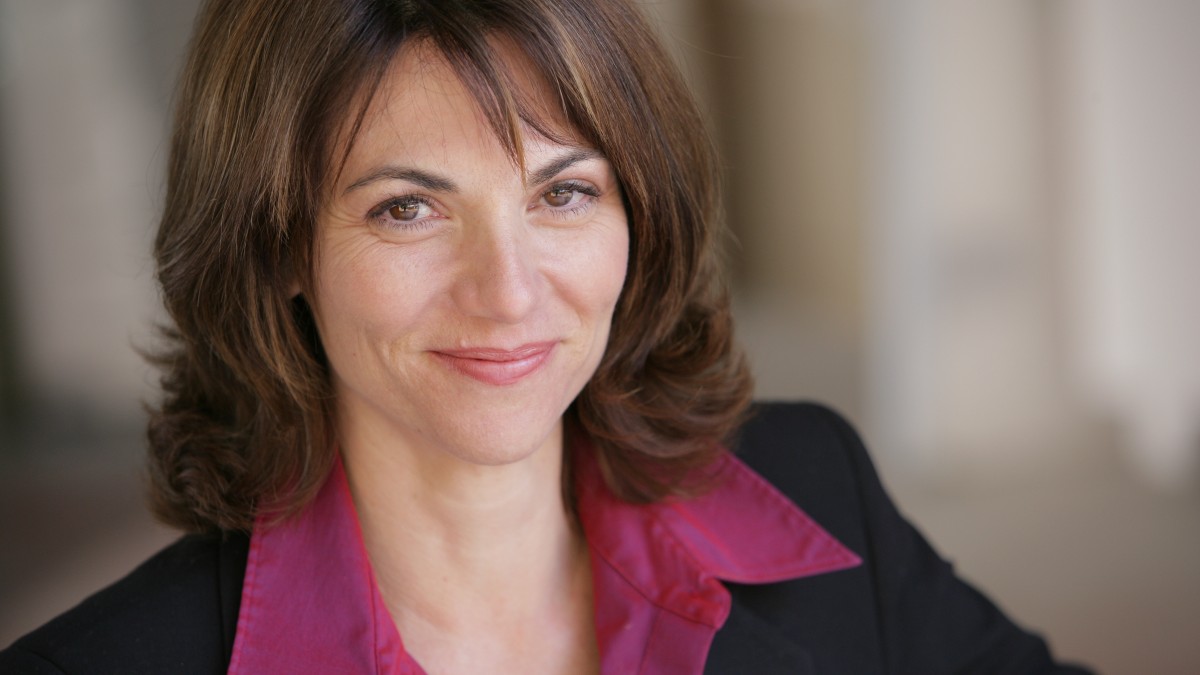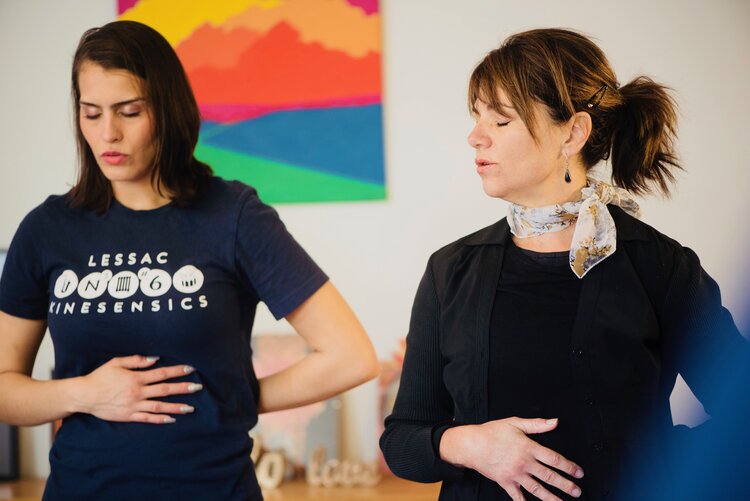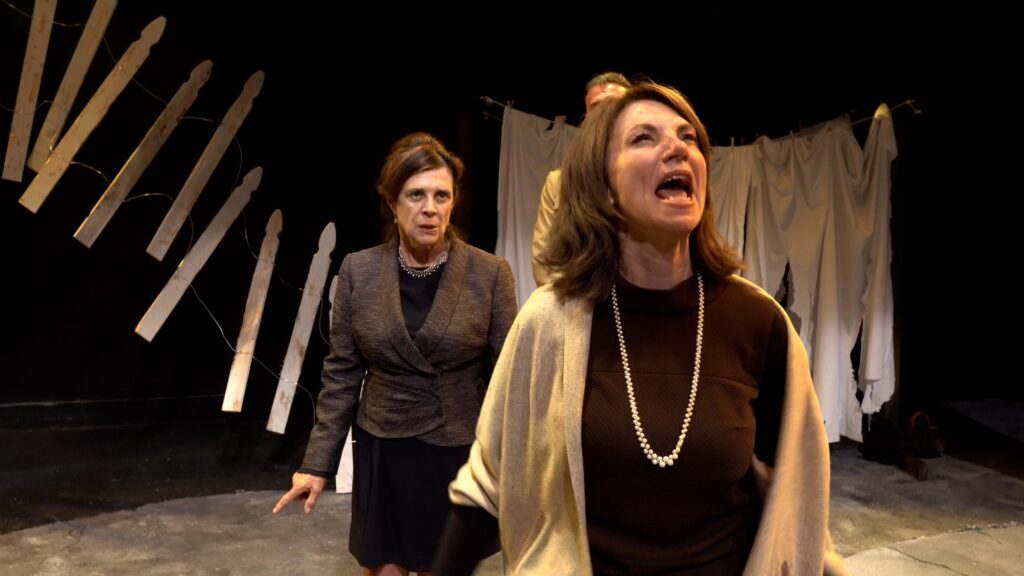
Kathleen Dunn-Muzingo found her love of acting very early on. Growing up in a big family, elaborate impromptu productions were par for the course.
“I had a lot of nieces and nephews, so to entertain them we would put on shows,” she recalled. “We put on shows in the corn crib, we put on shows outside in the barn, wherever we could find a place.”
During the summers, she and her family would travel to Gallup, New Mexico, where she befriended Navajo children and picked up fragments of the language, which she traces as the beginning of her interest in dialects.
“In those trips I experienced variety in sight and sound within the various voices of the U.S. … I remember playing games and laughing and having water balloon fights; all started via our body’s language and a few Navajo words I picked up here and there,” she said.
Dunn-Muzingo, now associate professor of theatre practice in voice and movement at the USC School of Dramatic Arts, kept up acting during her summers as an undergraduate, assuming she would become a teacher. But after graduation, she stepped into a last-minute role at a theatre festival, where she met casting director Mali Finn and her husband Don Finn. She followed them to a new MFA acting program at Cal State Fullerton.
Throughout her training, Dunn-Muzingo had been drawn to a book called The Use and Training of the Human Voice for reasons she didn’t quite understand. She gravitated toward its voice workouts and practiced them often — so when its author, Arthur Lessac, walked through the door at Fullerton, she knew she needed to explore the connection further.
“His voice training changed how I looked at text, how to deepen my voice for pitch power and playing powerful roles. Before that, I always played the ingenue. And that really solidified how voice work and speech work are so important to an actor as tools,” she said.

Finding her voice in dialects
Once she began working with Lessac, Dunn-Muzingo played over 20 dialect roles in film and theatre. She found herself interviewing people native to the dialects she was using, following a deep interest in carrying their stories onto the stage.
“It’s not about me, it’s about the story,” she said. “And from there, I began to study dialects and my friends always called me up to help … and so it just sort of snowballed from there. And I kept on honing that interest of phonetics and dialects.”
When Paul Backer, longtime SDA professor, saw her work on a local production that featured Irish dialects, he recognized her talent for dialect coaching and encouraged her to bring it to the students at USC.
“Right after I started teaching dialects at USC, I realized that I needed a process for the beginner actor to physically embody sounds and be very specific with what is taking place in their mouths,” she said.
She sought further training with Louis Colaianni, whose approach trains the beginning actor in voice areas of releasing, pitch, range and absorbing the international phonetic alphabet that later will be the basis of dialect acquisition.
“Going through embodying and sounding the phonetic alphabet in a very fun and engaged way, the student can identify what they are hearing in a dialect of English,” Dunn-Muzingo explained.
“The international phonetic alphabet is code for the world’s languages. Each sound is identified with a symbol and each symbol lives in a certain place in the mouth or has a particular action sensation with the tongue or lips.”

Dialects onscreen vs. onstage
As she dove deeper into dialect work, Dunn-Muzingo’s husband suggested she bring her work to film. As a film composer, he had seen dialect coaches working on set, and knew she could contribute her expertise there.
Now, she has worked on countless screen titles, including Mad Men, Marvel’s The Avengers, ABC’s How to Get Away with Murder and more. Her role ranges from pre-shoot coaching to on-set consulting, and even to post-production dubbing.
“You have to have like 100,000 different antennas going when you walk into a room to know kind of how this all fits, because it’s different personalities, different human beings, different stories, different needs of the story,” she said.
Tailoring the experience to a project’s needs is an integral part of her work, she says: once an actor is on set, there are so many forces that she’s often there for support and consultation. But beforehand, she and her clients can work on dialects for months at a time, interviewing and studying for the role. Her goal is that the research and preparation allows the actor the freedom to run once they’re on set, or in front of the camera.
“I feel like I’m a success when the actor is flying and doesn’t need me,” she said.
She feels similarly about her classes at SDA, where even at the beginning level, she works to provide her students the tools to become their own dialogue coach.
“I tell them, if you don’t use the accent, you’ll forget it in a month or two,” she said. “But they know about interviews, they know how to suss out the world of the play, they know where to look, they know how to break down the features … they know that that’s part of the dialect acquisition process.”
When she works on SDA productions, Dunn-Muzingo makes sure to get her script as soon as possible in order to begin that process with her students. She sees herself as a designer in that sense, shaping the way the voices come off the page.
In collaborating with the actors and the interviewees, she finds the process becomes truly rewarding. She recalls working on a SDA production of Holy Ghosts; one of the cast members had family from North Carolina, where the show is set.
“They went back and interviewed their family. And they brought their family voices in – oh, I loved that. And it meant more to the actors. By that time, they could hear some of the subtle features … that’s when it becomes really personal to the cast. Here at USC, that’s a lovely part of the process,” she said.
Having the time to work on a production for that long really provides the space for dialect acquisition, she explained. Those interviews allow the actor to carry not only their interviewees’ voices, but also their stories, into the work.
“I really believe, for me, that it takes time, space and compassion to create a deeper understanding of a role, especially picking up an accent or dialect of English, you are also investing your time in one’s culture. As a professor of speech and dialects, I hope that students find that time, space and a need to bring to justice to the voices one portrays [are ways] to build deeper appreciation of the other.”
See Dunn-Muzingo’s acting and dialect work onscreen as Reagan in Southern California Shakespeare Festival’s film version of King Lear, directed by Baron Kelly, streaming soon.